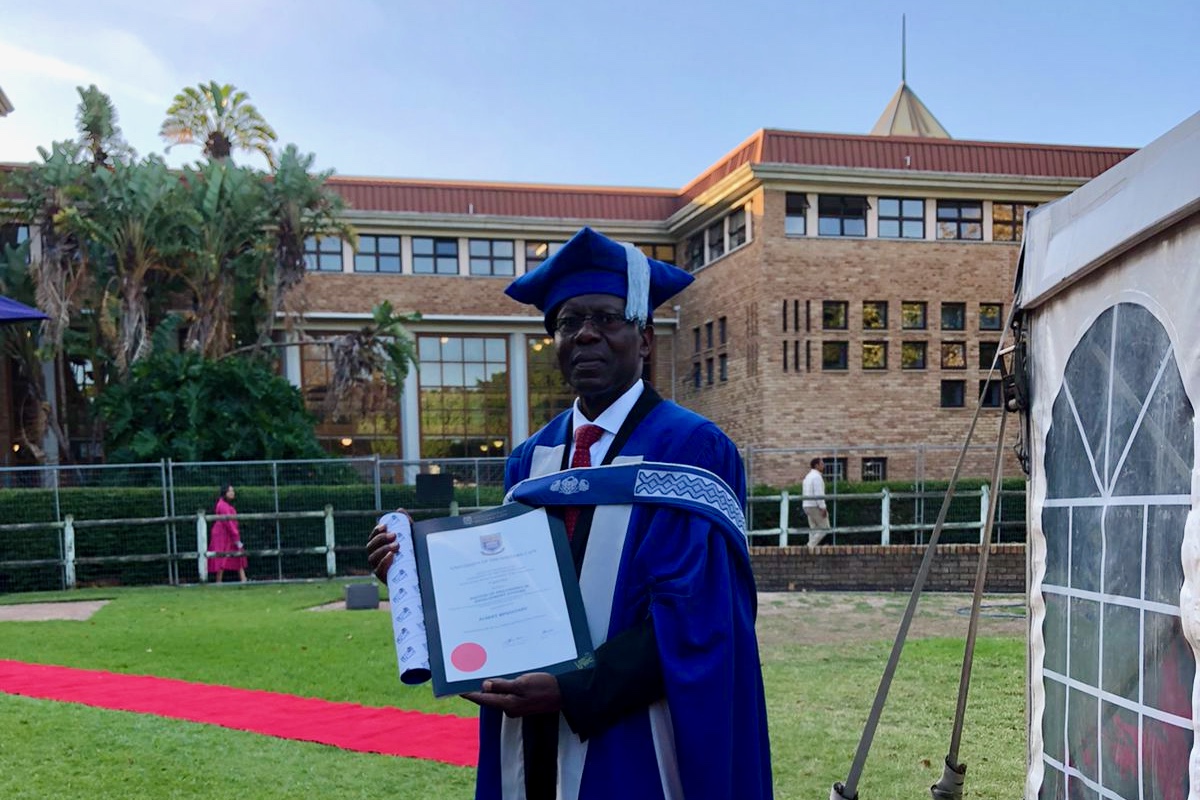Former car guard Albert Mpazayabo has graduated from the University of the Western Cape with a PhD. He says he wants to make a difference to the immigration system.
By Mary-Anne Gontsana
Albert Mpazayabo, who fled to South Africa from his home in Rwanda, worked for years as a car guard. He has now graduated with a PhD in development studies. He hopes his work on the integration of refugees will be taken seriously by the authorities.
Mpazayabo fled Rwanda during the genocide, seeking refuge in the Democratic Republic of Congo. But in 1995 he had to flee the DRC with his family.
He got his first job in South Africa in 1997, as a security guard, then found work in Kenilworth as a car guard, earning about R20 a day.
Since then he has graduated three times: with a bachelor’s degree in psychology, a master’s in 2014, and now his PhD at the University of the Western Cape.
He hopes his thesis on the integration of refugees in South Africa – “A Conceptual Framework for Effective Local Integration of Refugees in South Africa: Case Study of the Western Cape Province” – will contribute to improving the immigration system.
“As part of my social responsibility in South Africa, I am ready, willing and able to contribute towards fixing the crumbling SA refugee system, should I be given an opportunity to do so,” said Mpazayabo.
He got an asylum seeker permit in 1997 and a refugee permit in 2001. Though he has been in South Africa since 1997, Mpazayabo, 62, said he is still a refugee but is in the process of applying for permanent residency.
“In 2006 I applied for certification to the Standing Committee for Refugee Affairs (SCRA). But in 2008 I received a written note from SCRA advising me that my application had been rejected. SCRA argued that Rwanda was safe and that as a Rwandan I had no more grounds on which to continue enjoying international protection in SA,” said Mpazayabo.
He challenged the decision and in January 2017 decided to start the whole process again.
“Eventually, in late 2018, I had the historic opportunity to meet the SCRA team face-to-face at the Cape Town Refugee Reception Office.”
“I was given an opportunity to motivate my appeal, challenging SCRA’s initial decision. In 2021, l received a certification letter from SCRA certifying me as ‘refugee indefinite’, and enabling me to proceed and apply for a permanent residence permit,” said Mpazayabo.
But he could not apply immediately because the offices were closed during the Covid epidemic.
“I am only now in the process of finalising my permanent residency application.”
Graduating with a PhD has been “an exciting journey”, he says. It took him seven years, during which he earned money working as a tutor at UWC and doing community work. “I was disqualified from getting a scholarship because I am old; normally scholarships for PhD are for younger researchers,” he said.
He says refugees in South Africa face the twin problems of poor practices in the Department of Home Affairs and a lack of well-defined and progressive policies on integration.
He thinks South Africa should do more to challenge African governments which “oppress their own citizens and force them into exile, with South Africa as the top country of destination”. More could be done, he says, by regional institutions such as the Southern African Development Community, and continental institutions such as the African Union to develop human rights in these countries, which would encourage refugees to return.
Mpazayabo is in favour of transit centres for processing asylum seekers claims along South Africa’s borders, where asylum claims could be speedily dealt with. Successful applicants should be integrated into South African society through improved orientation and integration programmes, he says.
Follow African Insider on Facebook, Twitter and Instagram
Source: GroundUp
Picture: Supplied
For more African news, visit Africaninsider.com


